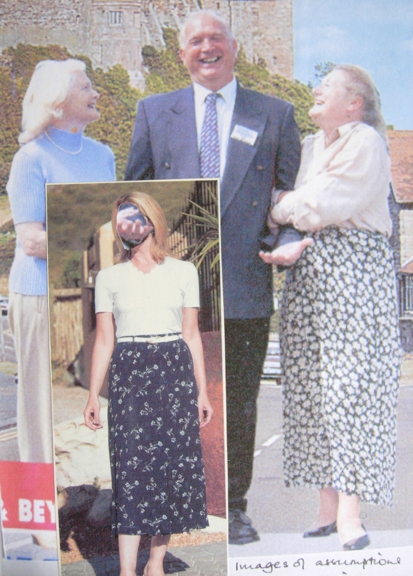Sarah Hervey has a note in her sketchbook, it reads, “Wittgenstein maintained every statement rested on unproven assumptions and illogical associations”.
With regard to language there are four problems outlined by Bertrand Russell in his 1922 introduction to Wittgenstein’s Tractatus Logico-Philosophicus:[1]
First is a problem of what actually occurs in our minds when we intend to mean something.
Second is the relationship between thoughts, words and sentences and what they refer to.
Third is a problem of constructing sentences to convey truth rather than falsehood – in a logical sense rather than in a factual sense of true and false.
Fourth, what relation must a fact have to another in order to be capable of being a symbol for it.
According to Russell’s essay, the fourth problem is what concerned Wittgenstein and it is at the heart of Sarah’s note to herself, which is positioned in relation to this image in her journal:

“In the language of everyday life it very often happens that the same word signifies in two different ways – and therefore belongs to two different symbols – or that two words, which signify in different ways, are apparently applied in the same way in a proposition [a statement]…[t]hus there easily arise the most fundamental confusions.”[2]
Ludwig Wittgenstein
The problem of clear communication is further complicated by psychology, the first of Russell’s four problems with language, and identity, the second. What does it mean to be vulnerable? We all know what it feels like and so we feel we can describe and understand it. But can we? David Minton a fellow exhibiting This ‘Me’ of Mine artist, asks Sarah if she thinks his male vulnerability is an attribute of feminine vulnerability, wondering “if the view of ‘masculine’ is dependent on the view of vulnerable as ‘feminine’?” It’s a compelling question.
Jane Boyer: Much of the vulnerability you are interested in and you explore is based in gender issues and ageing. Can you tell us what it is particularly about vulnerability, experienced through gender and age, which interests you?
Sarah Hervey: I think there has been a lot of research into why women live longer on the whole and have a resilience somehow, yet the way we are supposed to attract men is to be vulnerable, the weaker sex, so there’s all that dynamic which is interesting. Because I have this idea about skin and how your history shows on your face, so if you’ve had a life where you’ve felt vulnerable it will begin to show. As your body gets older you just appear more vulnerable because your skin gets thinner, your bones aren’t as strong, you find it more difficult to hold your head up straight and keep your back straight and so your body starts to cow. The different way men and women deal with that interests me; how we feel about that is the internal part of skin, then the way society looks at you is the external part. I mean, the essence of being female or male is different and I feel it is important to struggle to understand more precisely the positions of men and women within these boundaries. My point of view is as a woman. I can’t understand my own vulnerability and the vulnerability of women without understanding the vulnerability of men.
Read more of our interview, Without Any Voice. If you are enjoying reading about the issues involved with This ‘Me’ of Mine, follow the blog by clicking the ‘follow’ button under the heading Follow blog via Email at the bottom of each page and engage with us by leaving a comment, follow us on twitter @thismeofmine or like our facebook page, facebook/ThisMeofMine.
We recently announced our project venues; find out more about APT Gallery, Strange Cargo/Georges House Gallery and Colchester/Ipswich Museum on the blogsite.
Keep a weather-eye, an exciting announcement is coming soon regarding our sweet Art Pie…!
